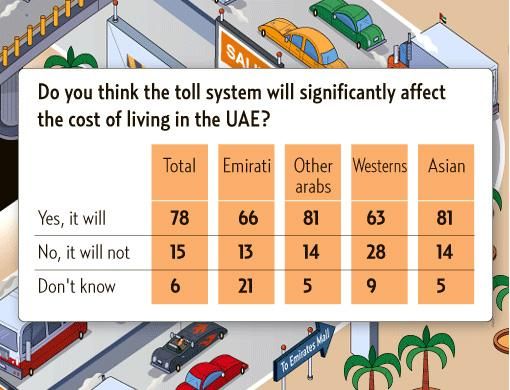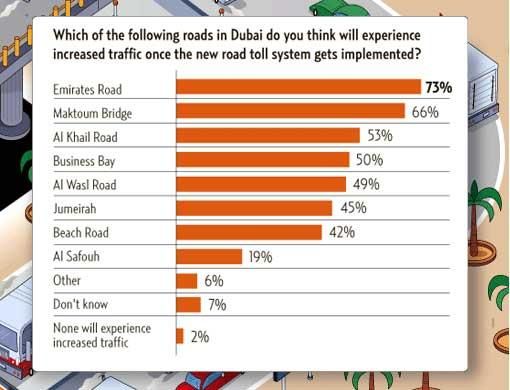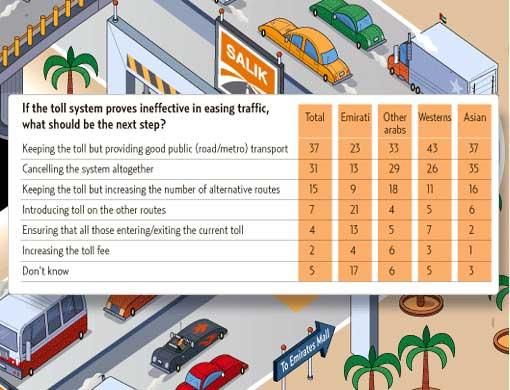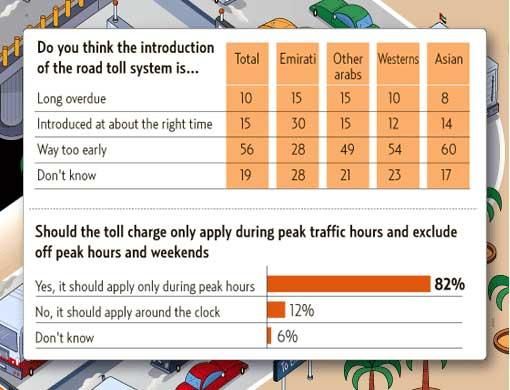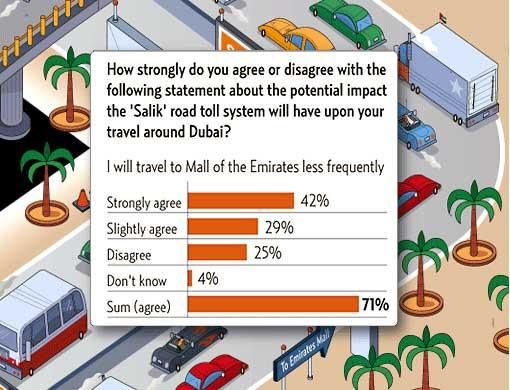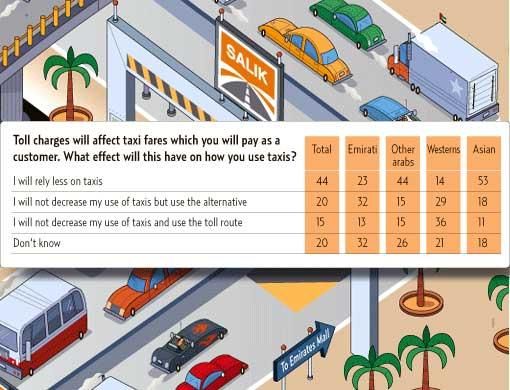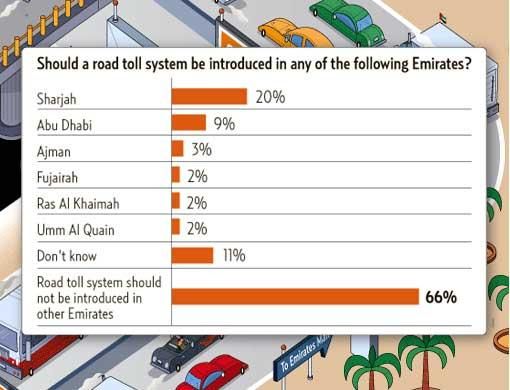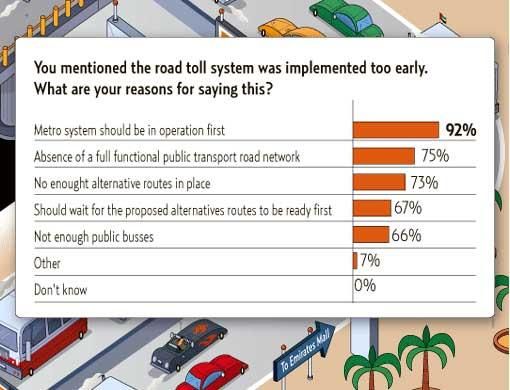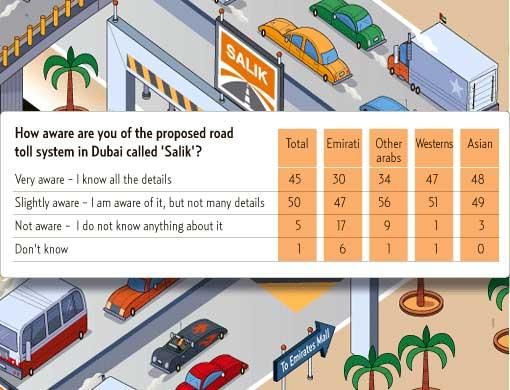In Arabic, Salik means clear so a Salik road is a road cleared of traffic. But for most UAE residents, this will not be the case when the new road toll system, dubbed too early by a majority vote, is introduced on Shaikh Zayed and Shaikh Rashid roads next month. Instead, roads will suffer from increased congestion.
Click here to see the survey results (pdf)
Emirates road will be most affected in terms of increased traffic followed by Al Maktoum Bridge and Al Khail road. The public's estimation of traffic congestion reduction with the introduction of Salik is 25.72 per cent, which is remarkably close to Dubai's government's announced estimate.
That is the main conclusion from the latest Gulf News survey undertaken by YouGov-Siraj whereby 680 UAE residents answered questions on the new road toll system. Of those polled, 47 were Emiratis, 80 were other Arabs, 98 were Westerners and 409 were Asians.
In general, there is a high level of awareness of Salik with a total of 95 per cent of UAE residents saying they're either very aware or slightly aware of details. Bearing that in mind, 17 per cent of Emiratis say they're not aware of anything about Salik.
How do UAE residents feel about Salik? To begin with, only 4 out of 10 are in favour of road tolls as a general concept and even less respondents (3 in 10) are in favour of the new Salik road toll system being introduced in Dubai. Instead, 66 per cent show disagreement with the new system. Non-Emiratis and Asians are the most vocal against it, followed by Westerners (nearly 6 in 10) and Emiratis (nearly 5 in ten). Also, there is a pattern in response when it comes to age; the older the respondent, the more likely he/she agrees with the new toll system.
Interestingly, 66 per cent don't believe the Salik system should be rolled out to other emirates in the UAE. This is the case especially amongst Asians with 7 out of 10 showing opposition to such a proposal. The remaining respondents mainly choose Sharjah as an emirate that should follow in the footsteps of Dubai and introduce a road toll system.
We asked our respondents which roads in Dubai they think will experience increased traffic once the new road toll system gets implemented. Unsurprisingly, 7 out of 10 said Emirates road. Here is a list of other roads that are expected to be the most congested (from most to least): Maktoum Bridge, Al Khail Road, Business Bay, Al Wasl Road, Jumeriah, Beach Road and Al Safouh Road.
There are a few optimists amongst UAE residents who feel some benefits are expected from the new toll system (although nearly 3 in 10 feel the system will not have any advantages). The expected benefits range from reduction in traffic congestion (30 per cent), providing speedy access during emergency situations (29 per cent) to a reduction in pollution (21 per cent).
The disadvantages of the new toll system include: increasing congestion on alternative routes, increasing accidents on alternative routes, an adverse effect on businesses along the toll routes, and the fact that bikes, which help reduce traffic congestion, are also subject to toll.
Overall however, despite some reservations, the public's estimation of traffic congestion reduction with the introduction of Salik is 25.72 per cent, which is remarkably close to Dubai government's announced estimate.
Our respondents' main concern is that the introduction of the road toll is "way too early". A closer look though reveals that Emiratis feel differently from other nationalities (Westerners, Asians, and other Arabs). That is, the number of respondents coming from other nationalities (Westerners, Asians, and other Arabs) is double that of Emiratis who feel the toll system is being introduced ahead of its time (an average of 57 per cent vs. 28 per cent).
For those who criticise Salik (56 per cent of our respondents), there is a strong feeling amongst them that there is no viable alternative transport system outside of the main highway. Nine out of 10 respondents say Salik is being introduced too early and claim the metro-rail should be in operation first. Other problems for the majority of UAE residents include the absence of a fully functional public transport road network (75 per cent), not having enough alternative routes in place (73 per cent) or public buses (66 per cent). The majority also feel that the toll system should have been held back until the proposed alternative routes are ready.
The overwhelming majority of Dubai residents say the tolls should only operate during peak hours and not throughout the day. Moreover, there should be a flat rate allowing multiple entries either daily, monthly or biannually.
Will the introduction of a toll system have an affect on the use of taxis across the country? Around 4 out of 10 residents say they will rely less on taxis in the future as the cost of tolls is expected to increase the cost of fares generally. This is especially the case amongst Asians with 5 in 10 saying they will rely less on taxis. In contrast, 36 per cent of Westerners say toll charges will not decrease their use of taxis and they will continue to use the toll route.
The majority of our respondents think the toll system will significantly affect the cost of living in the UAE. It is therefore expected that when it comes to the issue of reimbursement, UAE residents across nationalities and salary brackets feel employers should reimburse employees for toll charges accrued in the course of their job.
According to our respondents, the new system will have the following effects:
- Five out of 10 respondents feel they will travel to Sharjah (from Dubai) less frequently
- Six out of 10 respondents will visit businesses that require them to pass through the toll less often
- An overwhelming 8 out of 10 respondents will travel the same amount but will use different routes
- Nearly 4 out of 10 respondents will contemplate moving residential location to avoid the toll and
- Worryingly for the Mall of the Emirates, 71 per cent of UAE residents say they will visit the mall less frequently than they have in the past.
Should the toll system prove ineffective in easing traffic, our respondents are split on what should be the next step; while many feel the toll system should be kept provided good public transport is introduced, around one third feel the system should be cancelled altogether.


